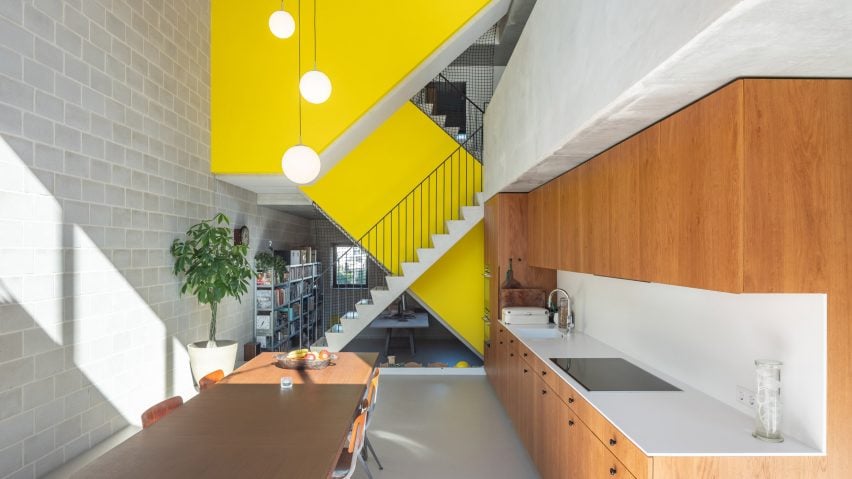Dutch architecture studio BETA has built a house in Amsterdam for a multi-generational family with a central yellow staircase connecting their separate accommodation.
BETA designed the Three-Generation House for a couple with young children who already lived in the city, and their parents who wanted to move in.
The architects describe Three-Generation House as a "mini apartment building" that is designed so it can be adapted over time.
The elderly couple currently occupies the apartment at the top of the building, while the bottom floors contain the young family's living spaces.
A lift provides access to the grandparents' apartment, which features level floors for improved accessibility and offers expansive views across the city.
The lower apartment contains an office and living spaces on the ground floor that open onto a garden where the children can play outside.
A central floor currently provides guest accommodation for the upper apartment, but can easily be added to the lower residence if required.
All of the levels are accessed from a staircase positioned at the centre of the building, which serves to divide up the interior spaces and creates a bold focal point.
"Instead of reducing vertical circulation to a necessity, it occupies the heart of the building," the studio said.
"Omnipresent as a sculptural element in the lower apartment, the system gradually transforms into a series of voids higher up in the building."
Externally, Three-Generation House's opposing facades reflect the arrangement of the internal programme and respond directly to its context.
The predominantly closed northern facade helps to reduce thermal loss and prevents noise from the busy street outside reaching the interior.
The glazed southern elevation maximises passive solar gain and incorporates balconies that soften the transition between indoors and outdoors.
The house's plan also transitions from more intimate and compartmentalised rooms to the north, to more open-plan and light-filled living spaces to the south.
"In a near elementary detailing, the building communicates its composition and materials communicate their purpose," BETA added. "Closed and bare towards the north, light and fragile towards the south, the building is a composition of contrasts."
Structural walls throughout the home feature exposed concrete masonry blocks that support concrete slabs spanning eight metres.
The concrete surfaces contrast with wood that is used to define different functional zones within the spaces and to introduce a warmer hue.
The bright yellow staircase adds a playful accent, while plants provide a further natural detail.
Architects have come up with some inventive ways of housing multiple generations of a family under one roof. Other examples include a house in Seoul, designed as if three separate homes were piled on top of each other.
Photography is by Ossip van Duivenbode.
Project credits:
Architect: BETA
Team: Auguste van Oppen, Evert Klinkenberg
Climate advisor: Huibert Spoorenberg,
Engineer: Huibers Constructieadvies
Contractor: ATB Leerbroek
Woodworker: Sibe Visser

